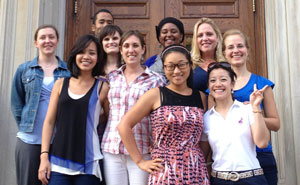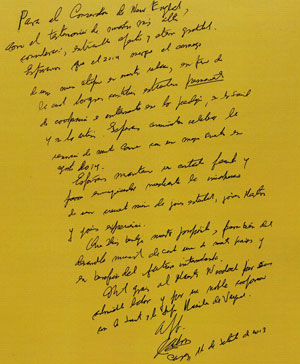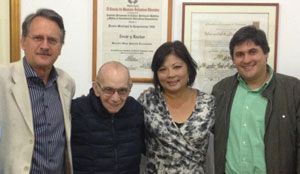Sistema Fellows Go Forth
NEC President Tony Woodcock Describes Evolution of Program
Abreu Wish Fulfilled: President Tony Woodcock Describes Evolution of Sistema Fellows Program
 Dear friends of NEC,
Dear friends of NEC,
As you undoubtedly know, we are currently in the fifth year of the Sistema Fellows Program at NEC. It is hard to believe how quickly time has gone by since Dr. José Antonio Abreu issued his challenge to us in his 2009 TED Prize Wish. He asked us to create a professional training program for 50 postgraduate musicians—10 per year— who are passionate about creating careers for themselves that connect music, youth, and social change. Already there are four classes, 40 alumni Fellows, out in the field where they are acknowledged leaders and experts in the El Sistema-inspired North American network. The fifth class (in photo above) has begun its training and will follow their predecessors in this important work when they graduate next summer. We have fulfilled Dr. Abreu’s Wish and the results are extremely compelling. Consider these achievements:
Every one of the alumni is contributing to the field.
- Sistema Fellows are transforming communities in 25 cities in the U.S. and around the globe.
- In 2010, when the first class of Sistema Fellows entered the field, their programs served approximately 600 children. This year, close to 5,000 children are being served in programs involving Sistema Fellows.
- Current program enrollment ranges from fewer than 20 to more than 400 children with operating budgets that range from approximately $25,000 to $1.3 million.
- On average, each child spends close to 10 hours per week in El Sistema-inspired programming involving Sistema Fellows. Cumulatively, then, children across all US nucleos will spend approximately 1.5 million hours in musical training this year.
- Programs involving Sistema Fellows employ more than 250 teaching artists.
 We’re not the only ones who are proud of our Fellows’ accomplishments. We have a letter (in photo right) from Dr. Abreu himself thanking us, praising the work of the Fellows, and envisioning a grand celebration in Venezuela next summer. He wrote it while Leslie Foley and I were in Venezuela last month discussing next steps. I’ve attached it at the bottom of this letter. I must add here, though, that NEC couldn’t have achieved what it has without the active partnership and support of Dr. Abreu and his El Sistema (FundaMusical Bolívar) colleagues. They have been unfailingly generous to us, particularly during the Fellows’ annual residencies in Venezuela.
We’re not the only ones who are proud of our Fellows’ accomplishments. We have a letter (in photo right) from Dr. Abreu himself thanking us, praising the work of the Fellows, and envisioning a grand celebration in Venezuela next summer. He wrote it while Leslie Foley and I were in Venezuela last month discussing next steps. I’ve attached it at the bottom of this letter. I must add here, though, that NEC couldn’t have achieved what it has without the active partnership and support of Dr. Abreu and his El Sistema (FundaMusical Bolívar) colleagues. They have been unfailingly generous to us, particularly during the Fellows’ annual residencies in Venezuela.
So what are the next steps?
Based on our analysis of the field, a survey conducted among the first four classes of alumni, and many requests, NEC has decided it could best serve the movement going forward by building on the work already accomplished. That is, by strengthening and enhancing the expertise and skills of the 50 alumni Fellows.
After discussion with arts management consultant Greg Kandel and senior advisor/ teaching artist Eric Booth, who have been deeply involved in the Sistema Fellows program and the entire field from its inception, NEC has decided it will work over the next two years to:
- Provide Professional Development. This will include supplemental training in organizational management, curriculum development, teacher training, finance, board development, and fundraising. This can be done on campus through classes in our School of Continuing Education or online through webinars.
- Facilitate Field Work. We will help facilitate Fellows and their staff to observe and experience other programs, both in the United States and in Venezuela.
- Provide Networking and Collaboration Opportunities. This will enhance the Fellows’ program success through convenings and reunions during which these leaders can learn from each other, adopt best practices, and renew friendships.
- Develop Online Resources. Our expanding repository of materials will offer invaluable guidance to those working in the field.
 We have consulted with the leaders of El Sistema in Venezuela and they have embraced our new strategy, while celebrating the success of the past five years. (In photo, l to r, Tony Woodcock, José Antonio Abreu, Leslie Wu Foley and Eduardo Mendez in Venezuela in September.)
We have consulted with the leaders of El Sistema in Venezuela and they have embraced our new strategy, while celebrating the success of the past five years. (In photo, l to r, Tony Woodcock, José Antonio Abreu, Leslie Wu Foley and Eduardo Mendez in Venezuela in September.)
Our plan, then, is one of reinvestment in our Fellows. We are enormously proud of the great work they are doing and we want to assist and sustain them as they move beyond the foundational level of their programs into the more mature phases.
In addition, we want to find ways to integrate the ideals of El Sistema more completely into our college curriculum, including working in conjunction with our outstanding Entrepreneurial Musicianship program and Community Performances and Partnerships program. Our hope is to deepen NEC students’ commitment to become citizen artists. As the Fellows are already demonstrating, El Sistema offers a new vision of musicians in the community, one that takes them from the periphery to the center as agents of transformation. It’s a vision that beckons musicians to become what Dr. Abreu calls “Apostles to Society.”
As always, if you have any questions, I’m more than happy to answer them.
Best regards,
Tony Woodcock, President
Letter from José Antonio Abreu:
September 11, 2013
To New England Conservatory, as a testimony of our highest esteem, affection and eternal gratitude.
We hope that the year 2014 will mark the start of a new stage in our relationship, through which we shall be able to build permanent cooperation and exchange programs in the pedagogic, social and artistic realms. We eagerly hope to celebrate the renewal of our cooperation agreement in a great celebratory event in August 2014.
We hope to maintain an enriching and fruitful connection through the inclusion of a growing number of young students, teachers and experiences.
May God bless our objectives, for the benefit of the musical development of each of our countries and in benefit of our mutual collaborations.
Many thanks, Maestro Woodcock, for your admirable work and your noble support of the Venezuelan children and youth.
